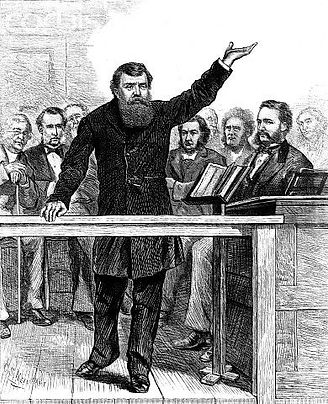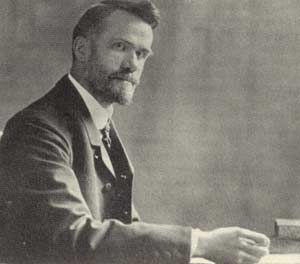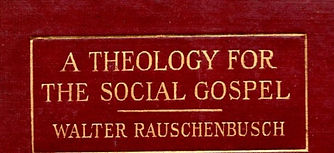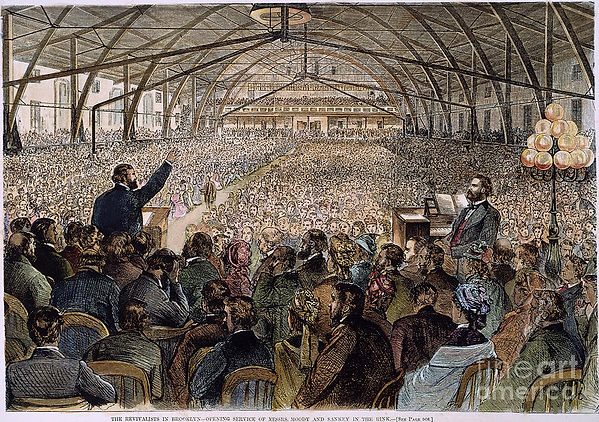
Walter Rauschenbush and Dwight L. Moody

“Walter Rauschenbusch was born on Oct. 4, 1861, in Rochester, N.Y., He was the son of a German missionary, and reared in a pietistic environment. Years of study in his youth in Germany provided him with scholarly intellectual equipment and introduced him to the then revolutionary ideas shattering traditional dogmas.” ("Walter Rauschenbusch.") “Rauschenbusch believed that men rarely sinned against God alone and that the Church must place under judgment institutional evils as well as individual immorality.” (“Walter Rauschenbusch”) The depression of 1893 had a great effect on Rauschenbusch. “As he observed during the depression of 1893, "One could hear human virtue cracking and crumbling all around." (“Walter Rauschenbusch”) “Upon the publication of Christianity and the Social Crisis (1907), Rauschenbusch gained recognition as the major spokesman of the Social Gospel movement in the United States.” (Britannica School) Although “The social gospel was never the dominant element in the movement for urban reform. But the engagement of religion with reform helped bring to progressivism a powerful moral commitment to redeem the lives of even the least favored citizens.” (Alan Brinkley, 521) Rauschenbusch like Moody “recognized the demonic in man, understood the power of entrenched interest groups, and predicted no easy or early establishment of God's reign of love.” ("Walter Rauschenbusch.")



Citation:
"D.L Moody Story." Moody Bible Institute. N.p., n.d. Web. 10 Feb. 2016. <http://www.moody.edu/DL-moody/>.
Marsden, George M., and William L. Svelmoe. "Evangelical and Fundamental Christianity." Encyclopedia of Religion. Ed. Lindsay Jones. 2nd ed. Vol. 5. Detroit: Macmillan Reference USA, 2005. 2887-2894. World History in Context. Web. 9 Feb. 2016.
"Dwight L. Moody." Encyclopedia of World Biography. Detroit: Gale, 1998. World History in Context. Web. 9 Feb. 2016.
Dwight L. Moody." Britannica School. Encyclopædia Britannica, Inc., 2016. Web. 10 Feb. 2016. <http://school.eb.com/levels/high/article/53595>.
"Walter Rauschenbusch." Britannica School.Encyclopædia Britannica, Inc., 2016. Web. 9 Feb. 2016. <http://school.eb.com/levels/high/article/62789>.
MACMASTER, R. K. "Moody, Dwight Lyman." New Catholic Encyclopedia. 2nd ed. Vol. 9. Detroit: Gale, 2003. 842-843. World History in Context. Web. 9 Feb. 2016.
"Walter Rauschenbusch." Encyclopedia of World Biography. Detroit: Gale, 1998. World History in Context. Web. 9 Feb. 2016.
Picture URL:
Moody grew up in Massachusetts during the industrial revolution era. This era had an effect on his life, religion, and persuasion methods. “Moody left his mother’s farm at 17 to work in Boston and there was converted from Unitarianism to fundamentalist evangelicalism.” (Britannica School) “In 1860 Moody left his business career to work full time for the YMCA. This experience was essential in preparing him for his eventual work as a revivalist.” (Encyclopedia of World Biography) He organized the North Market Sabbath School in 1858 and formed a non denominational church in 1863.” ("Moody, Dwight Lyman.") In 1866 he became the president of the Chicago YMCA. Later “in 1867 Moody visited England, immediately establishing contacts with important English evangelists.” ("Dwight L. Moody.") “In 1870 he met Ira D. Sankey, a hymn writer, and with him became noted for contributing to the growth of the “gospel hymn.” (Britannica School) “As well as conducting revivals, he directed annual Bible conferences at Northfield, Mass., where he founded a seminary for girls in 1879. In 1889 he founded the Chicago Bible Institute (now the Moody Bible Institute).” (Britannica School) “Moody was a visionary who always seemed a step ahead of the status quo. From training women, to reaching out to lost children, to bridging the gap between denominations, he was unlike any other.” (“D.L Moody Story”) Moody left his mark on many foundations. “Most notably the Salvation Army, founded in England in 1865, combined their evangelism with extensive charitable work among the needy.” (Lindsay Jones)
